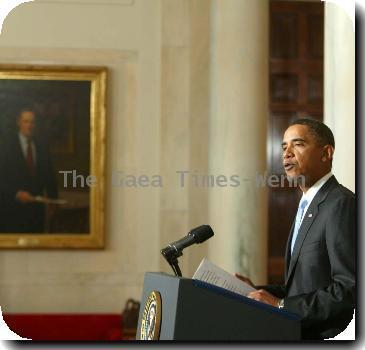Who’s gonna sweat? Bookies lay bets on Britain’s 1st US-styled televised political debates
By Paisley Dodds, APWednesday, April 14, 2010
Britain holds 1st televised election debates
LONDON — Britain holds its first U.S.-styled debates in the race for prime minister Thursday — a real wild card in a wildly unpredictable election.
The three leaders vying to lead the next government — Prime Minister Gordon Brown of the Labour Party, Conservative leader David Cameron and Nick Clegg of the Liberal Democrats — admit they’re nervous about the debate, which pollsters say could attract some 20 million television viewers.
The election is the closest Britain has seen in years, underscoring the importance of the debates. The television duels are also important because political parties are barred from paid television ads in Britain — mistakes and glories alike will be repeatedly broadcast on YouTube and over the Internet.
“This is the big wild card,” said Robert Worcester, founder of the Ipsos MORI polling firm. “The polls have been static since the beginning of the year. … This could be the thing that breaks the deadlock.”
Brown and Cameron have called in experts from President Barack Obama’s election campaign. Brown is advised by media guru Michael Sheehan and polling expert Joel Benenson. Cameron has tapped ex-White House communications director Anita Dunn.
In Brown’s rehearsals, Tony Blair’s former communications chief Alistair Campbell has taken the role of Cameron, and predicts Brown’s command of detail will shine.
Blair refused a debate ahead of his landslide 1997 victory, prompting the then governing Conservatives to dress an aide in a chicken outfit and follow him on his campaign tour.
“It breaks new ground in British politics and for that reason it’s a very, very interesting day,” Health Secretary Andy Burnham, a Labour lawmaker, told GMTV television.
The candidates will take audience questions on domestic issues Thursday. The following debates on April 22 and April 29 will focus on foreign policy issues and the economy, the most significant of all issues in the May 6 election.
But the debates may prove to be more anti-climatic than the raucous question time in Parliament where political rivals regularly verbally skewer each other.
Some 76 guidelines govern the live 90-minute debates, a painstaking format to which all three parties finally agreed.
A panel of journalists chose questions for the leaders that will be asked directly by members of a 200-strong studio audience selected by pollster ICM. The audience must stay quiet. Leaders won’t know the questions in advance and won’t be able to confront one another directly.
A ComRes poll found 31 percent of respondents said they wouldn’t watch the debate, and of those that will tune in only half believed it would have any influence on their ballot. The survey of 1,001 adults April 12-13 had a margin or error of plus or minus 3 percentage points.
While British governing parties have been reluctant to agree to such prime-time spectacles, debates have been near regular fixtures in U.S. presidential elections since 1960, when front-runner Richard Nixon, pale after a hospital stay, gave a lackluster performance against the tanned and affable John F. Kennedy.
Nixon rallied in following debates but the damage was done. Some 70 million people witnessed the carnage.
Afterward, more than half of all U.S. voters said the debates had influenced their opinion.
“I could see the same situation where David Cameron is the Kennedy figure and Gordon Brown is the Nixon figure,” said Frank Luntz, a U.S. Republican political consultant.
Brown, 59, is perhaps the most desperate of the three candidates, but pollsters say expectations are so low for him that even a modest performance could be seen as a win.
Although Brown is praised for his intellect, he often appears clumsy on screen — he uses the same phrases, speaks in a monotone and frequently looks disheveled or tired.
Analysts say the big risk for Brown is stepping too far out of character — he was skewered for a recent YouTube appearance in which he was smiling wildly.
The 43-year-old Cameron is favored by bookmakers to win the first debate with 5/6 odds. Brown is at 7/4 odds, while Clegg has 5/2.
Articulate, privileged and married to an aristocrat’s daughter, Cameron has been trying to convince voters that Margaret Thatcher’s party cares about the poor and disadvantaged. Often compared to the charismatic Tony Blair, who brought the Labour Party back to power 13 years ago, Cameron is often seen cycling or doing Web cams of his family life.
But it’s unclear whether his folksy “Just call me Dave” campaign or his pregnant wife’s visits to soup kitchens have convinced a dubious electorate.
Luntz said it won’t be enough for Cameron to just look or sound good — he’ll need to back it up with substance.
A Populus poll on Thursday for the Times newspaper showed the Labour Party closing in on the Conservatives. The poll gave the Conservatives 36 percent — a drop of 3 percentage points — to Labour’s 33 percent. The Liberal Democrats had 21 percent. The margin of error was 2.5 percentage points.
Clegg, 43, is the least experienced politician and considered the hothead of the three. But just by participating, the third-place Liberal Democrats have achieved some parity with the two larger parties and can promote their socially liberal, fiscally conservative platform.
Associated Press Writers Gregory Katz and David Stringer contributed to this report.
Tags: Arts And Entertainment, Barack Obama, Campaigns, David cameron, England, Europe, Foreign Policy, Gordon Brown, London, Nick clegg, North America, Television Programs, United Kingdom, United States, Western Europe




